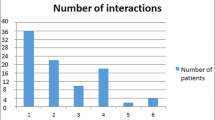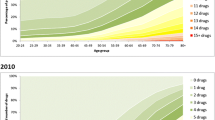Abstract
Objectives: The risk of adverse drug reactions (ADRs) increases with the number of drugs used. Most studies refer to potential interactions; the results regarding the severity of occurring and registered ADRs are inconsistent. Therefore, we examined the relevance of drug-induced problems in the elderly in general practice and their association with polypharmacy.
Design: Retrospective cross-sectional analysis of prospectively collected data.
Setting: Three family practices participating in the medication and morbidity Registration Network Groningen (RNG).
Methods: From 2185 elderly patients (>64 years) medication and morbidity data were collected over the period of 2 years (1994 and 1995). Polypharmacy was defined as the long-term simultaneous use of two or more drugs. Adverse reactions recognised as such were coded as a separate `diagnosis' A85. The most risky drug groups and the most prevalent diseases in relation to ADRs were studied.
Results: The incidence of ADRs in general practice was 5.7 per 100 elderly patients and the prevalence 6.1 per 100. Moderate polypharmacy was more frequent in the elderly who experienced adverse effects; no other differences in degree of polypharmacy could be found. The elderly who experienced adverse reactions used overall more different drugs (14.4 ± 7.6, of which 1.5 ± 1.5 were used long term) than the other elderly patients (8.1 ± 5.7, of which 1.0 ± 1.5 were long term). The incidence of ADRs increased non-significantly with the number of drugs used long term. Antibiotics, antihypertensives and non-steroidal anti-inflammatory drugs were mainly responsible for gastrointestinal complaints (nausea, diarrhoea and stomach pain) and rash. In the cases of treating urinary tract infections and sleeping disorders, there was a significantly high risk of ADRs. Slightly more at risk for adverse drug reactions were older patients with coronary heart disease or asthma/chronic obstructive pulmonary disease.
Conclusion: Most of the ADRs observed in general practice turn out to be rather harmless. This is in agreement with outpatient studies, though not with hospital studies. An increased risk of adverse effects with the number of drugs used simultaneously, as reported in other studies, was not confirmed in our study. This study however is limited to actually registered effects.
Similar content being viewed by others
Author information
Authors and Affiliations
Additional information
Received: 4 December 1998 / Accepted in revised form: 10 June 1999
Rights and permissions
About this article
Cite this article
Veehof, L., Stewart, R., Meyboom-de Jong, B. et al. Adverse drug reactions and polypharmacy in the elderly in general practice. E J Clin Pharmacol 55, 533–536 (1999). https://doi.org/10.1007/s002280050669
Issue Date:
DOI: https://doi.org/10.1007/s002280050669




